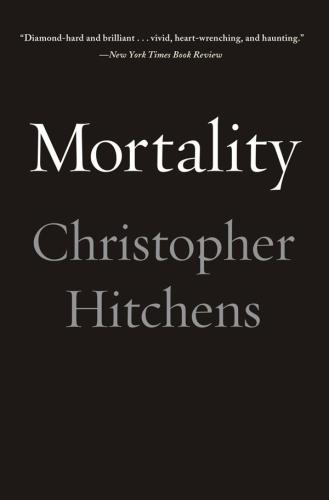
Mortality
کتاب های مرتبط
- اطلاعات
- نقد و بررسی
- دیدگاه کاربران
نقد و بررسی

Starred review from July 30, 2012
Diagnosed with the esophageal cancer to which he eventually succumbed in December 2011, cultural critic Hitchens found himself a finalist in the race of life, and in his typically unflinching and bold manner, he candidly shares his thoughts about his suffering, the etiquette of illness and wellness, and religion in this stark and powerful memoir. Commenting on the persistent metaphor of battle that doctors and friends use to describe his life with cancer (most of this book was published in Vanity Fair), Hitchens mightily challenges this image, for “when you sit in a room... and kindly people bring a huge transparent bag of poison and plug it into your arm, and you either read or don’t read a book while the venom sack gradually empties itself into your system, the image of the ardent soldier is the very last one that will occur to you.” As a result of his various treatments, Hitchens begins to lose his voice, which, given his life as public gadfly through writing and speeches, devastates him. “What do I hope for? If not a cure, then a remission. And what do I want back? In the most beautiful apposition of two of the simplest words in our language: the freedom of speech.” Hitchens’s powerful voice compels us to consider carefully the small measures by which we live every day and to cherish them.

Starred review from August 15, 2012
A jovially combative riposte to anyone who thought that death would silence master controversialist Hitchens (Hitch-22, 2010, etc.). Even as he lay--or sat or paced--dying in the unfamiliar confines of a hospital last year, the author had plenty to say about matters of life and death. Here, in pieces published in Vanity Fair to which are added rough notes and apothegms left behind in manuscript, Hitchens gives the strongest possible sense of his exhausting battle against the aggressive cancer spreading through his body. He waged that battle with customary sardonic good humor, calling the medical-industrial world into which he had been thrust "Tumortown." More arrestingly, Hitchens conceived of the move from life to death as a sudden relocation, even a deportation, into another land: "The country has a language of its own--a lingua franca that manages to be both dull and difficult and that contains names like ondansetron, for anti-nausea medication--as well as some unsettling gestures that require a bit of getting used to." One such gesture was the physician's plunging of fingers into the neck to gauge whether a cancer had spread into the lymph nodes, but others were more subtle, including the hushed tones and reverences that came with the business. Hitchens, famously an atheist, visited the question of whether he should take Pascal's wager and bet on God, concluding in the negative even as good God-fearing citizens filled his inbox with assurances that God was punishing him for his blasphemies with throat cancer. A reasonable thought, Hitchens concludes, though since he's a writer, wouldn't such a God have afflicted his hands first? Certainly, Hitchens died too soon. May this moving little visit to his hospital room not be the last word from him.
COPYRIGHT(2012) Kirkus Reviews, ALL RIGHTS RESERVED.

Starred review from August 1, 2012
For his millions of fans, Hitchens was like a valued dinner guest who never outstayed his welcome. His books, magazine columns, and verbal sparring rounds with the God-fearing best and brightest will stand as hymns to reason, and their smartly barbed rationality will never become tired or trite. Unfortunately, Hitchens has prematurely vacated his place at the table, leaving us wanting more. And here is more. Spare as it is and culled from several of his final Vanity Fair columns, this pamphlet-like tome resurrects great wit and insight from his final year of living dyingly. It would not be classic Hitchens unless he tackled prayer head-on. He does so brilliantly, quoting Ambrose Bierce and following prayer's logic to its circular conclusion. He addresses proper cancer etiquette and the best way to offer advice (don't). With a foreword by Vanity Fair editor Graydon Carter and an afterword by Hitchens' widow, Carol Blue, this offers a final course, a dessert, if you will, from the crusty yet tenderhearted atheist to be read and relished.(Reprinted with permission of Booklist, copyright 2012, American Library Association.)

























دیدگاه کاربران